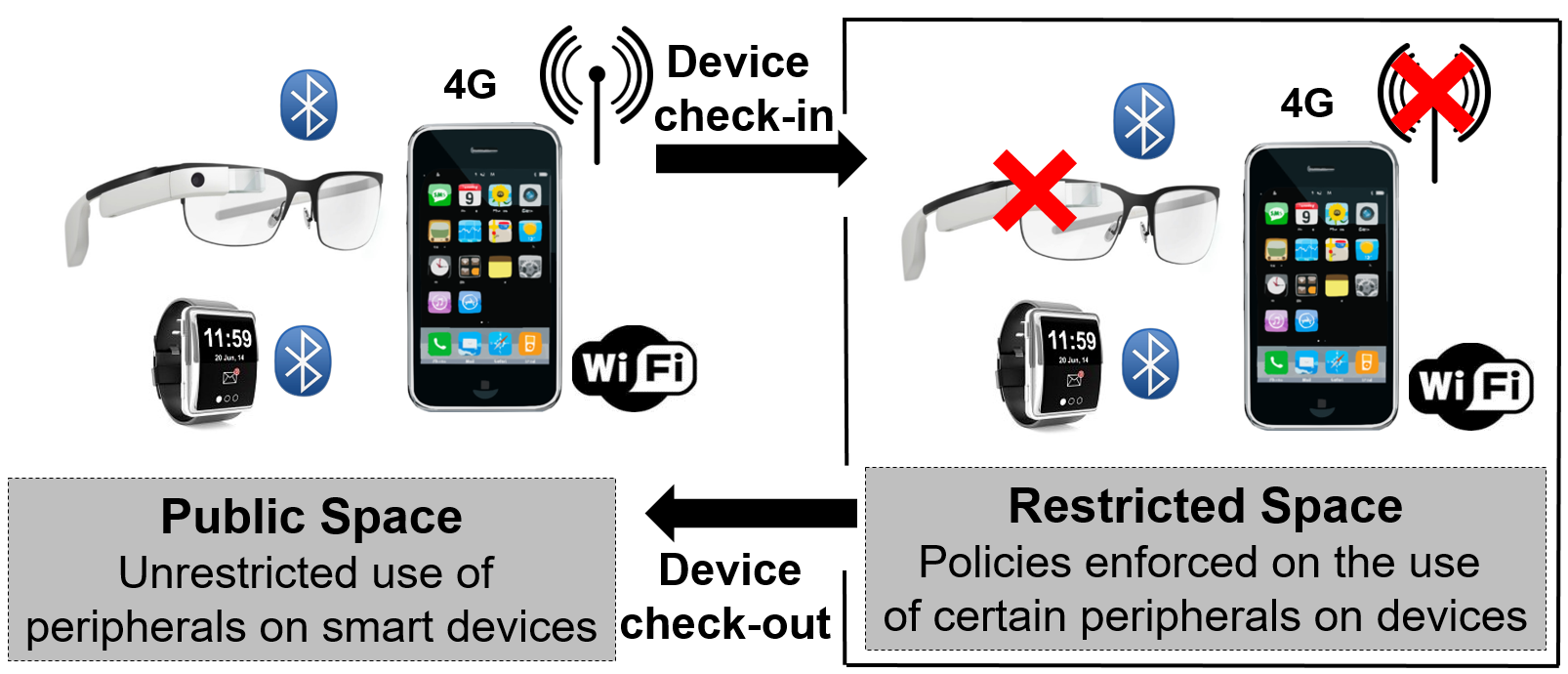This work appears in the 2016 ACM International Conference on Mobile Systems, Applications and Services (MobiSys 2016).
Personal computing devices, such as phones, tablets, glasses, watches, assistive health monitors and other embedded devices have become an integral part of our daily lives. We carry these devices as we go, and expect them to connect and work with the environments that we visit. While the increasing capability of smart devices and universal connectivity are generally desirable trends, there are also environments where these trends may be misused. In enterprise settings and federal institutions, for instance, malicious personal devices can be used to exfiltrate sensitive information to the outside world. In examination settings, smart devices may be used to infiltrate unauthorized information, surreptitiously collude with peers and cheat on the exam. Even in less stringent social settings, smart devices may be used to record pictures, videos or conversations that could compromise privacy. We therefore need to regulate the use of smart devices in such restricted spaces.
Society currently relies on a number of ad hoc methods for policy enforcement in restricted spaces. In the most stringent settings, such as in federal institutions, employees may be required to place their personal devices in Faraday cages and undergo physical checks before entering restricted spaces. In corporate settings, employees often use separate devices for work and personal computing needs. Personal devices are not permitted to connect to the corporate network, and employees are implicitly, or by contract, forbidden from storing corporate data on personal devices. In examination settings, proctors ensure that students do not use unauthorized electronic equipment. Other examples in less formal settings include restaurants that prevent patrons from wearing smart glasses, or privacy-conscious individuals who may request owners to refrain from using their devices.
We posit that such ad hoc methods alone will prove inadequate given our increasing reliance on smart devices. For example, it is not possible to ask an individual with prescription smart glasses (or any other assistive health device) to refrain from using the device in the restricted space. The right solution would be to allow the glass to be used as a vision corrector, but regulate the use of its peripherals, such as the camera, microphone, or WiFi. A general method to regulate the use of smart devices in restricted spaces would benefit both the hosts who own or control the restricted space and guests who use smart devices. Hosts will have greater assurance that smart devices used in their spaces conform to their usage policies. On the other hand, guests can benefit from and be more open about their use of smart devices in the host’s restricted space.
Our vision is to enable restricted space hosts to enforce usage policies on guest devices with provable security guarantees. Simultaneously, we also wish to reduce the amount of trusted policy-enforcement code (i.e., the size of the security-enhanced software stack) that needs to execute on guest devices. To that end, this project leverages the ARM TrustZone on guest devices to offer provable security guarantees. In particular, a guest device uses the ARM TrustZone to produce verification tokens, which are unforgeable cryptographic entities that establish to a host that the guest is policy-compliant. Malicious guest devices, which may have violated the host’s policies in the restricted space, will not be able to provide such a proof, and can therefore be apprehended by the host. Devices that use the ARM TrustZone are now commercially available and widely deployed, and our approach applies to these devices.
We built and evaluated a prototype to show the benefits of our approach. We show that a small policy-enforcing code base running on guest devices offers hosts fine-grained policy-based control over the devices. We also show that a vetting service with a few simple sanity checks allows guests to ensure the safety of the host’s policy enforcement of guest devices.
